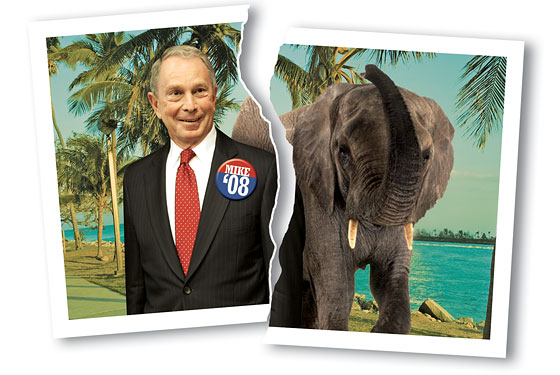
So Michael Bloomberg is still not running for president. Technically, anyway. Perhaps he’s really just enjoying seeing how often he can make the media jump and dance. Or maybe he’s simply following his stated agenda, to stave off lame-duckhood as long as possible by teasing the notion of a run for the White House.
But after the mayor’s performance in California last week, all that seems to remain is for mike ’08 to be painted on the side of his Gulfstream.
The sooner the better. Stop playing it cute and talking about “intentions.” And if Bloomberg is going to become the 21st legitimate candidate in the race, he’d better have something more substantial to offer than what he peddled in Silicon Valley.
Bloomberg’s speech at Google headquarters used a more cutting tone than he’s typically employed. But the points he made were truly banal. Politicians in Washington are bad? There’s too much partisanship in government? Geez, those are radical notions on which to base a third-party candidacy. America is unloved in the rest of the world? Stop the presses (and it’s hard to see how electing a megacapitalist would win us any global popularity contests).
Purely by biography, Bloomberg would of course be a novel presence as a presidential candidate: A short, divorced, Jewish billionaire, as he’s repeatedly and self-deprecatingly put it, would stand out, even in a field that already includes a woman, a black man, and a Mormon. But Bloomberg styles himself a high-minded truth-teller who is willing to apply common sense to tough choices and is above the old, tired political calculations. Yet his other significant act last week was purely political and a continuation of probably the most cynical thing he’s done in public life. In announcing that he’s shifting his voter registration from Republican to unaffiliated, Bloomberg claimed this “brings my affiliation into alignment with how I have led and will continue to lead our city.”
Please. His big accomplishments (311, crime reduction, the smoking ban) and initiatives (reorganizing the public schools) have indeed been nonideological. But Bloomberg’s party affiliation since he became a politician has never had anything to do with political beliefs. His jump from lifelong membership in the Democratic Party to the GOP was naked expediency when he did it in 2000, a paper conversion merely for the sake of increasing his chances of being elected mayor. To portray his latest switch as an expression of his political character is silly. If he’d bolted the party over George Bush’s disastrous war in Iraq or even because of congressional Republicans’ stiffing the city on money to rebuild after September 11, Bloomberg would have shown real guts (as Michael Tomasky wrote in this magazine way back in 2003). Instead, he’s spent most of his time at City Hall claiming that his Republican ties were a boon to the New York when he needed to lobby Washington, hosting Dick Cheney at a fund-raiser in his Upper East Side house, giving the keys to the city to the Bush campaign in 2004 as an election prop, and dodging questions about the war by saying that Iraq is “not a local issue.”
Last week, Bloomberg argued that breaking with the Republicans frees him to speak his mind. Ha. To switch now is opportunistic. Again. Bloomberg should stop pretending he’s suddenly become mortified by partisanship and run for president or not run. Then he could say with a straight face that he’s truly different from the craven career pols.
Posturing aside, quasi-candidate Bloomberg can make a hugely valuable contribution—if he continues to press issues like poverty, illegal guns, and immigration reform, thickets that the major-party candidates avoid or talk around. Which may be the true reason behind Bloomberg’s timing, why he’s stoking the hype now. He’s smart enough to know that at some point, probably next February, the media and voters will stop paying attention to people who aren’t definitively in the race. If Bloomberg doesn’t run, these next few months are his last best chance to use his megaphone and shape the discussion, and he should exploit them as exhaustively as possible.
Last week, Bloomberg spoke as if all the major-party candidates are equally bad, that the country will be “really in trouble” no matter who wins in 2008. We heard that argument from an independent candidate in the 2000 presidential race. Absolutely no one believes the world would be the same today with Al Gore in the White House. Bloomberg, when musing about the presidency, has said that the question he asks himself is, “Do you really want the job?” But as his aides concoct long-shot scenarios to convince him he could actually win, the question Mike Bloomberg needs to ask is this: By running for president, do you really want to risk becoming Ralph Nader?
Have good intel? Send tips to intel@nymag.com.